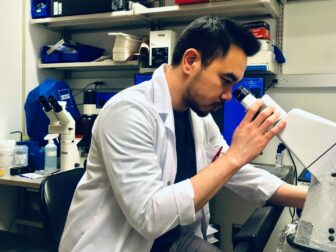Albert S. Agustinus

Targeting Chromosomal Instability and Epigenetics to Halt Cancer Metastasis
Summary
Chromosomal instability (CIN) is a hallmark of aggressive human cancers. Currently, there are no available drugs that target CIN, despite its well-documented role as a driver of cancer metastasis and therapeutic resistance. CIN provides cancer cells with genetic heterogeneity, due to constant shuffling of their genomic makeup. Another major way cancer cells resist treatment and adapt to their environment is by epigenetic reprogramming. This allows cells to alter their timing and level of gene expression, enabling them to utilize pathways used in normal tissue development to acquire stem-like properties that facilitate metastasis and therapeutic resistance. Our preliminary finding revealed, for the first time, an interconnection between CIN and epigenetic reprogramming. Chromosomally unstable cells produce micronuclei, due to chromosome mis-segregation during anaphase. We found that histone post-translational modifications (PTMs) were differentially enriched in the micronuclei of cancer cells, which have significant impact on their gene expression if the PTMs are reincorporated to primary nucleus upon micronuclei reintegration. On the other hand, we also found that chromosomally unstable cells tend to have increased stemness through epigenetic reprogramming by histone 3 lysine 27 trimethylation (H3K27me3) installed by enhancer of zeste homolog 2 (EZH2). We plan to unravel the mechanistic basis of these newfound relationships and exploit them to develop the first CIN-suppressive treatment (Aim 1). To counteract CIN, nature has developed a fail-safe mechanism by altering the dynamics of kinetochore-associated microtubules (kMTs), which are defective in cancer. We will test a panel of first-in-class small molecule compounds that have been shown to rescue this mechanism in otherwise aggressive cancer cells (Aim 2). As a whole, this project addresses an unmet need for the development of a first-in-class drug and therapeutic strategies to suppress CIN in human cancers.
Receiving the PhRMA Foundation Predoctoral Fellowship has helped tremendously in my thesis research, as well as to push the envelope in my scientific approaches to decipher unique mechanisms of cancer initiation and adaptation and potentially target them.
